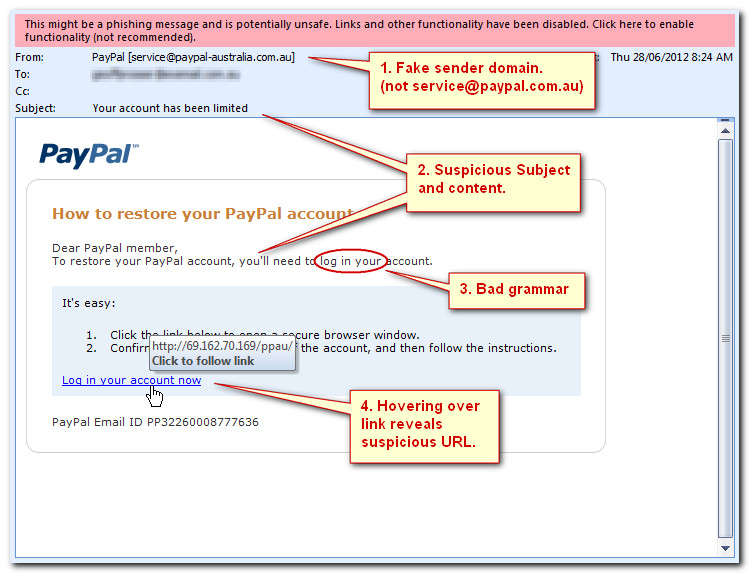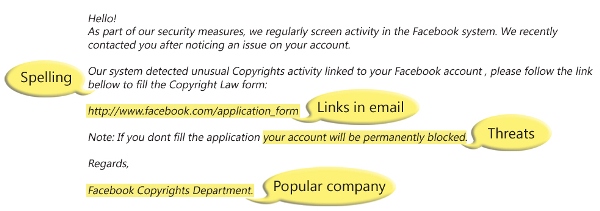Computer Repairs Brisbane News - CompuRepair
Phishing and You
Phishing
Phishing (pronounced fishing), is it a bad thing? The answer is a resounding yes, and just about everyone is at risk
of losing vital information to phishing including your credit card information, banking information, online account information, and more.
In this brief article you will get a basic explanation of what phishing is, why it is dangerous, and a few tips to help protect yourself.
If you do download malicious software accidentally or opened a phishing email and got infected check out Computer Repairs Brisbane
for more help.
Brisbane,
Logan,
Ipswich,
Springfield Lakes,
Forest Lakes,
North Lakes,
Sunshine Coast,
Yarrabilba or on the
Gold Coast.
Contact Us Now: 0403-755-519.
What is Phishing?
Phishing is an attempt at tricking someone into giving away their private information through electronic communication by
pretending to be from a trustworthy organization. Phishing is a homophone of fishing. This is because both of them use bait to attract and
catch prey. There are many ways phishing can be accomplished, and the use of it has been growing incredibly fast since it first started.
With 12,845 unique phishing reports in January 2005 up to 229,265 unique reports in March of 2016 (according to the
Anti-Phishing Working Group).
Clearly this is not just some small time scam, but something that will most likely affect everyone if it hasn’t already.
What does a phishing message look like? Often there are spelling or grammar mistakes, which a big company should never
have in their important emails. Threats of loss of service are another red flag to look for. Often times the links in the emails aren’t what
they appear, and lead to various malicious sites. There are many ways to make an email look professional when it isn’t actually. Some of
those ways include an email address that appears to be from the company, a proper signature, and even pictures and font styles of the company
they are imitating. A useful tip is that if you hover your mouse over a link without clicking on it you will see what the actual link you’d
be following is. Most importantly, if you are suspicious of an email you can call the company to verify that they are the ones who actually
sent it. If you’re near Logan, Brisbane or Ipswich and are having an issue, feel free to check out
Laptop Repairs Logan or
Computer Repairs Springfield Lakes
for more help.


Phishing is broken up into four classifications, phishing, spear phishing, clone phishing, and whaling.
Phishing
Phishing involves some kind of online communication that is supposedly coming from a trusted source.
This could be an email, direct message, and more recently, even a text message. The message usually will ask for some kind
of information either sent directly as a response, or by following a link.
Clone Phishing
Clone Phishing is an attack where a legitimate email, that contained an attachment or link, is copied
to create an almost identical email. The big difference is that the attachment or link will be replaced with a malicious
version.
If you need fast and reliable service you can contact CompuRepair at any time. CompuRepair can help with
computer repairs in Brisbane,
computer repairs in Logan,
computer repairs in Ipswich, we also can help with
laptop repairs in Springfield Lakes,
laptop repairs in Forest Lakes,
virus removal North Lakes,
computer repairs on the Sunshine Coast,
computer repairs in Yarrabilba or any IT related issues on the
Gold Coast.
Ring Us Now: 0403-755-519.
Spear Phishing
Spear Phishing is a more effective version of phishing, because it is an attack directed at one person instead
of multiple people. Attackers will usually gather personal information about the target to better personalize their message and
increase the odds of success.
Whaling
Whaling is one of the most lucrative types of phishing scams. These are phishing scams aimed towards high
level executives and upper management of large companies. The messages are generally business oriented. They usually use either
a subpoena or a false company-wide concern to entrap them into giving up their information or downloading malicious software.
The message itself is often not the end of a phishing scam. The link you follow will often look just like the official website,
or at least quite close. There are also some scams that use a more covert method. They’ll use a pop-up window on a site’s
legitimate domain. This can include a pop-up asking for you to login, or asking for you to authorize something. Putting your
information into one of these pop-ups may even download malicious software to your computer and steal your information from the
inside, even if it doesn’t specifically ask for private information.
Conclusion
Phishing does pose a dangerous risk to your online information, but you can protect yourself against it.
Be careful who you give your information to, and watch out for threats from big companies. There are also many ways to report
phishing, including reporting it to the APWG, Scamwatch, CERT, Europol, or even the RCMP. There are a lot of organizations
trying to stop cybercrime like phishing, and they need victims to let them know when these attacks happen. Don’t let yourself
get fooled. Follow the link to
Virus Removal Brisbane if
you’re concerned for your computer’s health.
Here at CompuRepair, each and every one of our computer technicians has been carefully selected; we make sure that they
have the appropriate technical expertise and experience. So, if you need same day, onsite
computer repairs Brisbane,
Logan, Ipswich, Springfield Lakes, Forest Lakes, North Lakes, Sunshine Coast, Yarrabilba
or on the
Gold Coast
then
Contact Us
Now: 1300-82-92-62.
More Posts about Computer Repairs

